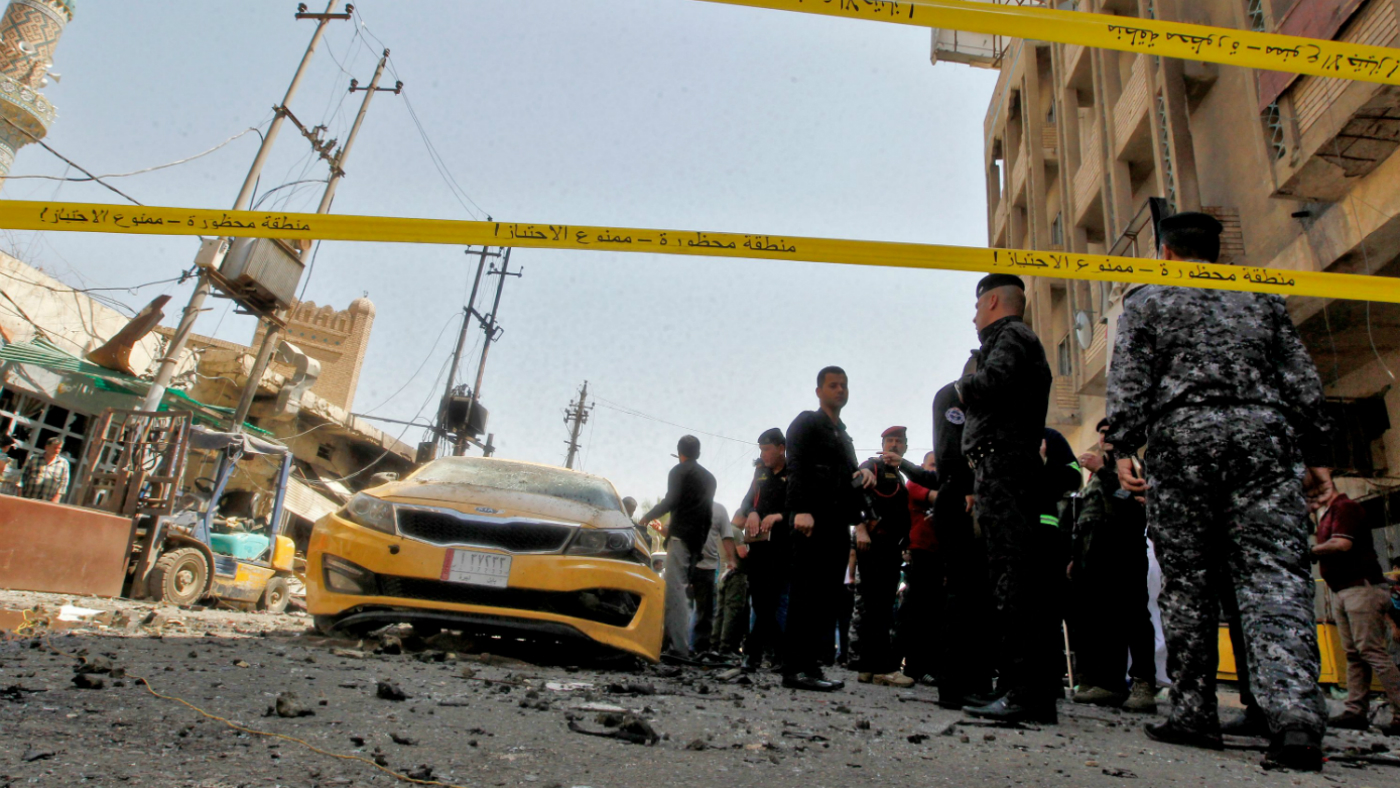Islamic State car bomb kills 15 at Baghdad ice cream parlour
Images posted on social media show ice cream cups scattered on blood-stained ground

A free daily email with the biggest news stories of the day – and the best features from TheWeek.com
You are now subscribed
Your newsletter sign-up was successful
At least 15 people have been killed and more than 30 injured after a car bomb planted by Islamic State exploded outside a popular Baghdad ice cream parlour.
The bomb detonated in the largely-Shia Karrada district of the city just after midnight on Monday night. The cafes and restaurants were crowded with people of all ages venturing out to break their Ramadan fast.
CCTV footage posted on Twitter by journalist Bassam Sebti purports to show the moment the rigged vehicle detonated:
The Week
Escape your echo chamber. Get the facts behind the news, plus analysis from multiple perspectives.

Sign up for The Week's Free Newsletters
From our morning news briefing to a weekly Good News Newsletter, get the best of The Week delivered directly to your inbox.
From our morning news briefing to a weekly Good News Newsletter, get the best of The Week delivered directly to your inbox.
Witnesses described a gory scene in the aftermath of the blast, Al-Jazeera reports, with images posted on social media showing ice cream cups scattered on the blood-stained floor of the parlour.
Video footage taken moments after the explosion shows scenes of panic, with distraught survivors bent over motionless bodies as a fire rages in the background.
Hours later, at around 9am local time, a second car bomb blast near the city's Martyrs' Bridge killed at least five more people.
Islamic State claimed responsibility for the attack through its Amaq news service, saying that a suicide bomber affiliated with the group had triggered the bomb to target "a gathering of Shia".
A free daily email with the biggest news stories of the day – and the best features from TheWeek.com
Islamic State militants follow an ultra-hardline interpretation of Sunni Islam that sees members of the Shia sect as apostates to be eradicated.
Middle East analyst Hayder al-Khoei told Al Jazeera that IS "timed Tuesday's attack to cause maximum impact".
The terror group is slowly being driven out of the city of Mosul, its last stronghold in Iraq, by a coalition of Iraqi government troops, regional Shia militias and Kurdish fighters.
Iraqi commanders are confident that Islamic State's days in the region are numbered, but "concede the group is likely to increase attacks in the wake of military defeats," says The Guardian.
Insurgent attacks often increase in prevalence and ferocity during the month of Ramadan, which began on Friday, in a twisted interpretation of the common belief that "good deeds" carried out during the holy month of fasting are met with increased divine reward.
An IS truck bomb which ripped through a packed market in the same district during last year's Ramadan killed 300 people, making it the deadliest attack in Baghdad since Saddam Hussein was ousted from power in 2003.
-
 The Olympic timekeepers keeping the Games on track
The Olympic timekeepers keeping the Games on trackUnder the Radar Swiss watchmaking giant Omega has been at the finish line of every Olympic Games for nearly 100 years
-
 Will increasing tensions with Iran boil over into war?
Will increasing tensions with Iran boil over into war?Today’s Big Question President Donald Trump has recently been threatening the country
-
 Corruption: The spy sheikh and the president
Corruption: The spy sheikh and the presidentFeature Trump is at the center of another scandal
-
 Epstein files topple law CEO, roil UK government
Epstein files topple law CEO, roil UK governmentSpeed Read Peter Mandelson, Britain’s former ambassador to the US, is caught up in the scandal
-
 Iran and US prepare to meet after skirmishes
Iran and US prepare to meet after skirmishesSpeed Read The incident comes amid heightened tensions in the Middle East
-
 Israel retrieves final hostage’s body from Gaza
Israel retrieves final hostage’s body from GazaSpeed Read The 24-year-old police officer was killed during the initial Hamas attack
-
 China’s Xi targets top general in growing purge
China’s Xi targets top general in growing purgeSpeed Read Zhang Youxia is being investigated over ‘grave violations’ of the law
-
 Panama and Canada are negotiating over a crucial copper mine
Panama and Canada are negotiating over a crucial copper mineIn the Spotlight Panama is set to make a final decision on the mine this summer
-
 Why Greenland’s natural resources are nearly impossible to mine
Why Greenland’s natural resources are nearly impossible to mineThe Explainer The country’s natural landscape makes the task extremely difficult
-
 Iran cuts internet as protests escalate
Iran cuts internet as protests escalateSpeed Reada Government buildings across the country have been set on fire
-
 US nabs ‘shadow’ tanker claimed by Russia
US nabs ‘shadow’ tanker claimed by RussiaSpeed Read The ship was one of two vessels seized by the US military